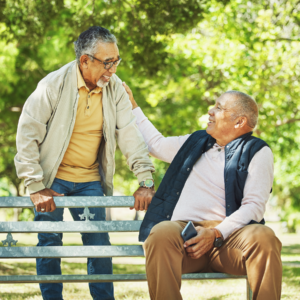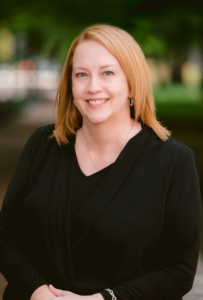The Friendship Bench
February 21, 2025
To Inspire:

Psychiatrist Dr. Dixon Chibanda understands the challenges of providing mental health services to underserved communities. His idea of tapping into community resources – in the form of “grandmas” and other older people – is helping his home country of Zimbabwe and is spreading around the world.
Chibanda remembers losing a young patient to suicide almost 20 years ago. Her family knew she needed help, but simply did not have the money to travel from their village to the hospital where he worked in Harare, Zimbabwe. At the time, there were only 10 psychiatrists serving 13 million people in the country.
While talking with some local grandmas, Chibanda came up with an idea involving the older generation. “These grandmas were actually the custodians of the local culture and the wisdom, and they were rooted in their communities. And I was like, what if we could train them to be the first port of call for anyone needing to talk in a community?”
This was the birth of the “Friendship Bench,” a talk therapy program that brings mental health support to communities. The program is free, with the grandmothers donating their time. Last year, more than 3,000 older listeners saw more than 300,000 people all over Zimbabwe.
With the current epidemic of loneliness and depression, the Friendship Bench program is expanding to vulnerable communities in nine countries, including the United States.
Here, the program is being piloted in Washington, D.C. by nonprofit HelpAge USA. A group of older men and women, known as “Grandparents,” have been trained and certified to provide problem-solving support and empathetic listening to Friendship Bench DC visitors of all ages.
Benches are set up at local “host partners,” which are safe community spaces, including senior wellness centers, schools, places of worship, and other nonprofit organizations, that offer the Friendship Bench DC service for free on their premises for the community members they serve. Community members can sign up to talk with a Grandparent sitting on the bench or be referred by staff.
Chibanda says, “There are a lot of people out there who are struggling to just connect with another human being. And this gives them that opportunity, to be able to sit down with someone who is empathic.”
In addition to talk therapy, the program includes a screening process that refers more serious cases to professionals. Dr. Chibanda continues to analyze and improve the program.
D.C. resident Arnette Ibitayo, 74, was struggling with the deaths of her son and brother when she turned to the Friendship Bench. “So, I’m, you know, feeling down, depressed,” she said. “I think I need to talk to somebody, because I felt like isolating and staying home. And it was very comforting to get it out. And I wasn’t judged, and I was able to speak freely, and the person gave me some helpful advice.”
What’s the secret to the success of the Friendship Bench? Chibana says the “grandparents” have natural abilities that come with having a long-lived life on the planet. They bring their life experience to the bench to help others and find fulfillment and a sense of purpose in helping their community.

Written by Michelle O’Brien, Manager of Marketing & Communications